Simple Estate Planning Checklist for Canadians
Written By Tiffany Woodfield, Financial Coach, TEP®, CRPC®, CIM®
Creating an estate plan can feel overwhelming, but it doesn’t have to be.
If you’re searching for an estate planning checklist, you probably want a clear, step-by-step guide.
Whether you’re starting fresh or updating your plan, this checklist will guide you through the critical steps. Keep in mind that estate planning often requires an estate planning attorney. In addition, it’s smart to get the help of your financial advisor when creating an estate plan.
And make sure you read the Q&A at the bottom to find out whether we have inheritance taxes and estate taxes in Canada.
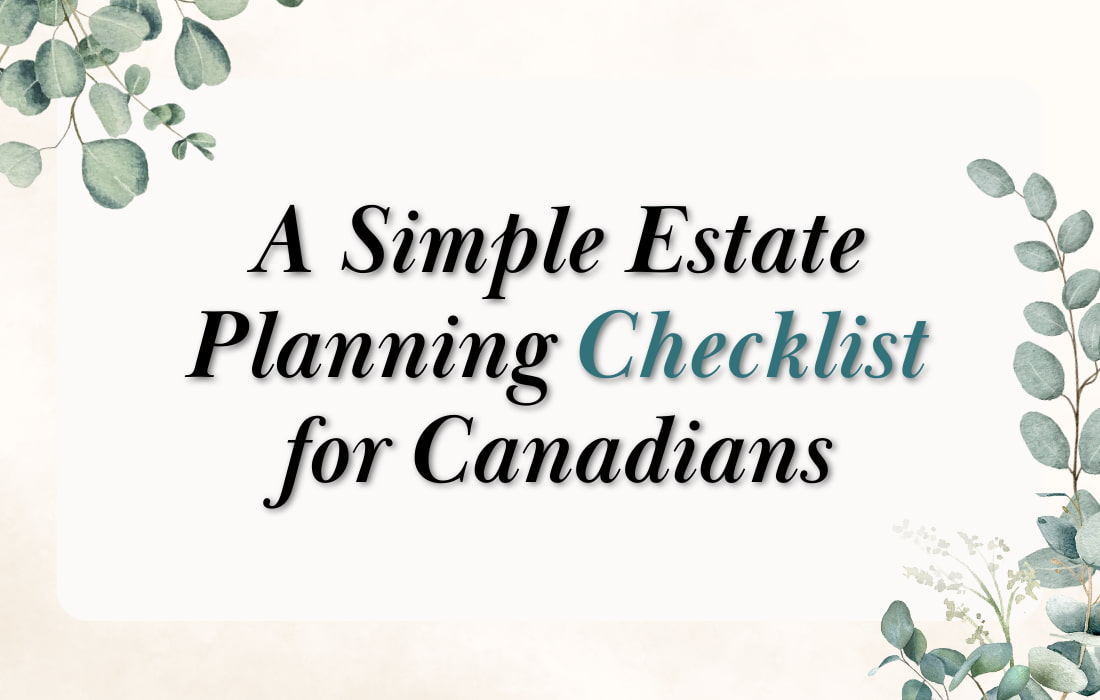
Table of Contents
- Estate Planning Is for Everyone with Assets
- Simple Estate Planning Checklist for Canadians
- What Exactly Is Estate Planning?
- What Is a Living Will, and Do You Need One?
- Why You Should Consult with an Estate Planning Attorney and Accountant
- Estate Planning Documents
- Estate Planning Q & A
Estate Planning Is for Everyone with Assets
Death is inevitable, and so far, nobody has been able to cheat it.
But why don’t more people do estate planning for their eventual death? The answer is simple: although we know we will die someday, it seems so far off in the future.
We say we’ll get to it when we are older, retired, have children, or have adult children.
Whatever the excuse, the reality is that we don’t want to think about a time when we are no longer around because that is emotionally hard for us to comprehend. However, if you don’t create an estate plan, some of the potential consequences are:
Without a properly structured estate plan, it’s likely your assets will not be distributed the way you would like. Fights will likely ensue, and more money will end up in the government’s hands.
Becoming incapacitated, even for a short time, and nobody has the authorization to manage your assets or make healthcare decisions for you.
If you have minor children and are without an estate plan, the court decides who becomes the legal guardian of your children.
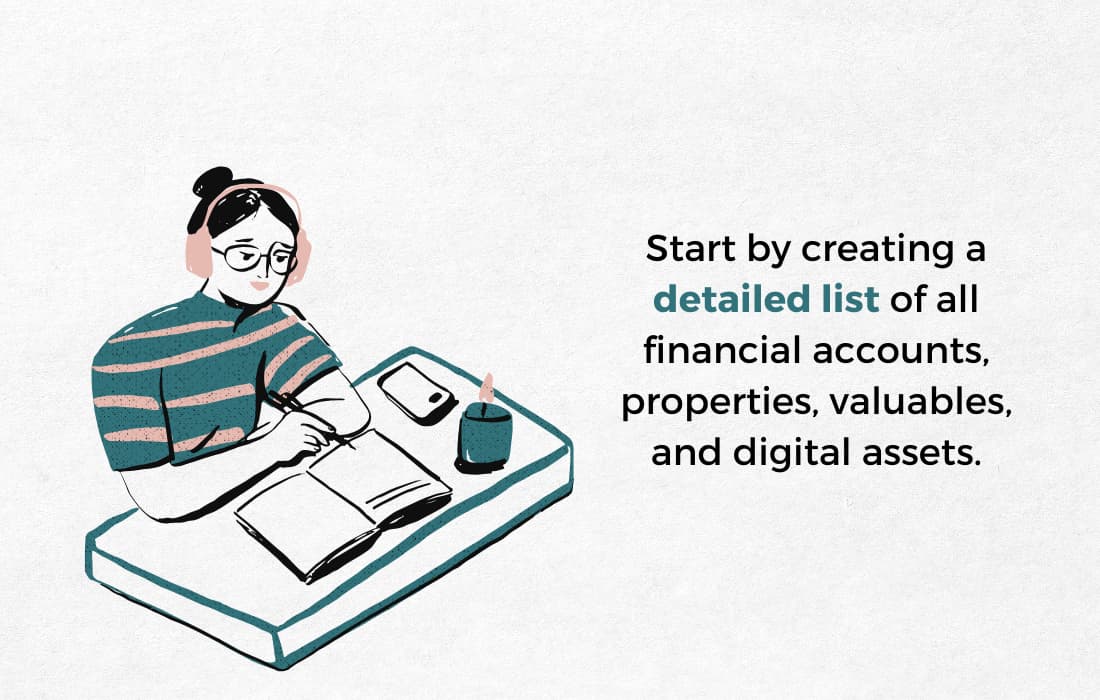
Simple Estate Planning Checklist for Canadians
1. Take Inventory of Your Assets
Start by creating a detailed list of all financial accounts, properties, valuables, and digital assets. This will help you gain a clear understanding of your estate and is essential for planning purposes.
2. List Your Family Members and Dependents
Document your immediate family members and any dependents to ensure that your estate plan properly accounts for their needs and the distribution of assets.
3. Create a Last Will and Testament
Draft a will that outlines the distribution of your assets and provides specific instructions for the care of minor children. This is a crucial part of any estate plan.
4. Plan for Minor Children
Appoint a guardian and consider creating a trust to ensure that your minor children are cared for and financially supported in the event of your death.
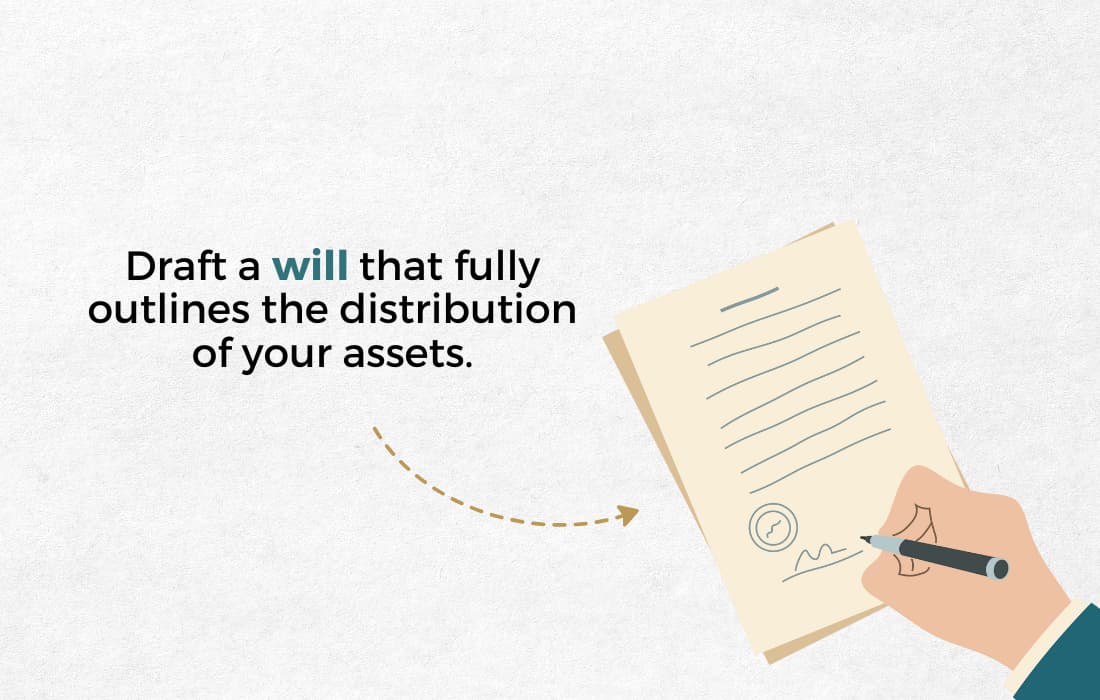
/Related Post: What Is Estate Planning in Canada?
5. Designate Your Beneficiaries
Choose the individuals or organizations who will receive your assets. Ensure that your wishes are legally documented and reflect your latest family and financial situation.
6. Opt for Power of Attorney (POA)
Select someone you trust to make financial or legal decisions on your behalf if you become incapacitated. This ensures that your affairs can be managed if you cannot do so.
7. Write a Living Will
Create a living will that outlines your healthcare preferences in case you become incapacitated. This document provides guidance for loved ones and medical professionals.
8. Consider a Living Trust
Establishing a living trust allows you to manage your assets during your lifetime and can help your beneficiaries avoid probate after your death.
9. Consider Your Estate Tax Obligations
Assess and plan for potential estate taxes. This is particularly important in Canada, where tax implications can affect the inheritance left to beneficiaries. Proper planning can help minimize these financial burdens.
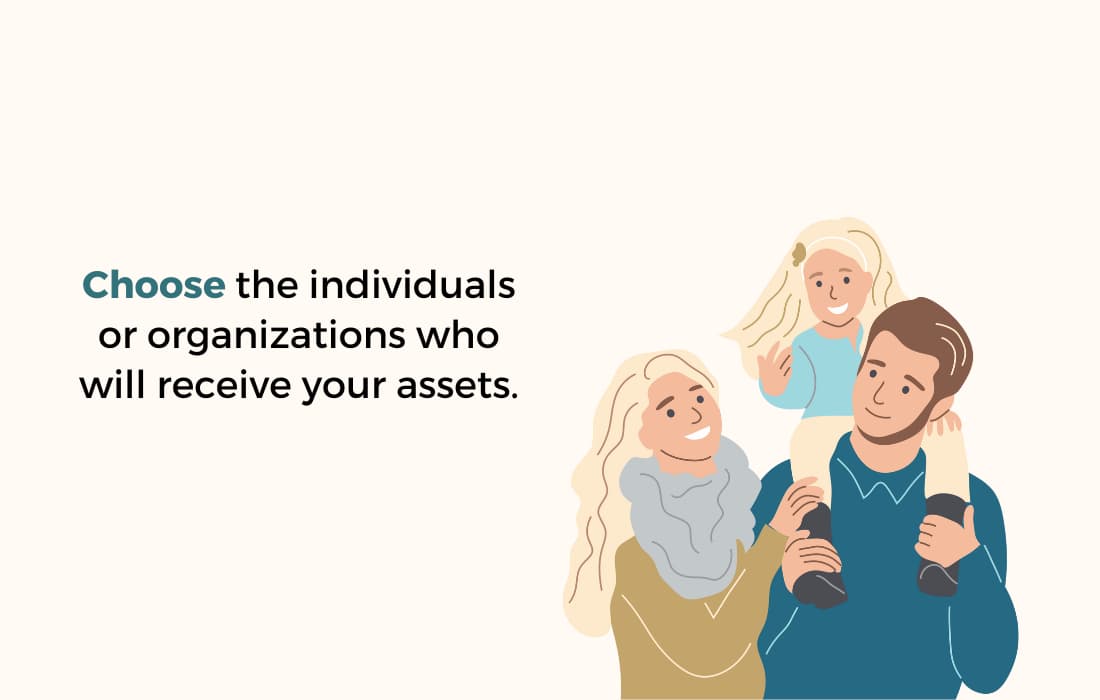
10. Ensure You Know the Provincial Laws
Research and understand the estate planning laws specific to your province or territory, as these laws can vary significantly and impact how your estate is managed. (Or speak to a professional.)
11. Manage Your Digital Assets
Document your digital accounts and assets, and consider naming a digital executor to manage your online presence and digital property after death.
12. Review and Update Your Documents Periodically
Regularly review and update your estate planning documents to reflect life changes, such as births, deaths, or changes in the law. This ensures your estate plan remains current and effective.

What Exactly Is Estate Planning?
Estate planning involves organizing your financial affairs and healthcare decisions to anticipate potential incapacity or your eventual passing.
In simple terms, estate planning ensures that your affairs are in order so that, should something happen to you, your wishes regarding financial matters and healthcare decisions can be honoured.
Many people mistakenly believe that creating a will constitutes complete estate planning. While drafting a will is crucial, it represents only one aspect of the broader estate planning process.
Effective estate planning takes into account the decisions that need to be made during your lifetime as well as after you have passed away.
Meanwhile, a will only comes into effect upon your death. Think of estate planning as a blueprint for how you want to protect your loved ones. It provides a framework to ensure your healthcare decisions are respected if you become incapacitated. It also ensures that your assets are managed according to your wishes and that you fully understand the impact of your decisions.

What Is a Living Will, and Do You Need One?
A living will is a legal document that specifies the medical care you wish to receive if you become incapacitated or seriously ill.
It is often referred to as a healthcare directive or advance directive. Having a clear legal document outlining your preferences for medical treatment is essential to ensure that your wishes align with your values and beliefs.
Why You Should Consult with an Estate Planning Attorney and Accountant
If you are serious about organizing your estate, consulting with an estate planning attorney and an accountant is crucial.
Their expertise will help you capitalize on tax planning opportunities and ensure your documentation is valid. Given the complexities and frequent changes in laws and regulations, professional guidance is invaluable.
For instance, complications often arise when individuals create a simple “online will” without fully understanding current legislation or the rights of dependents. This is especially important in cases involving multiple jurisdictions or blended families, where unique challenges may arise.
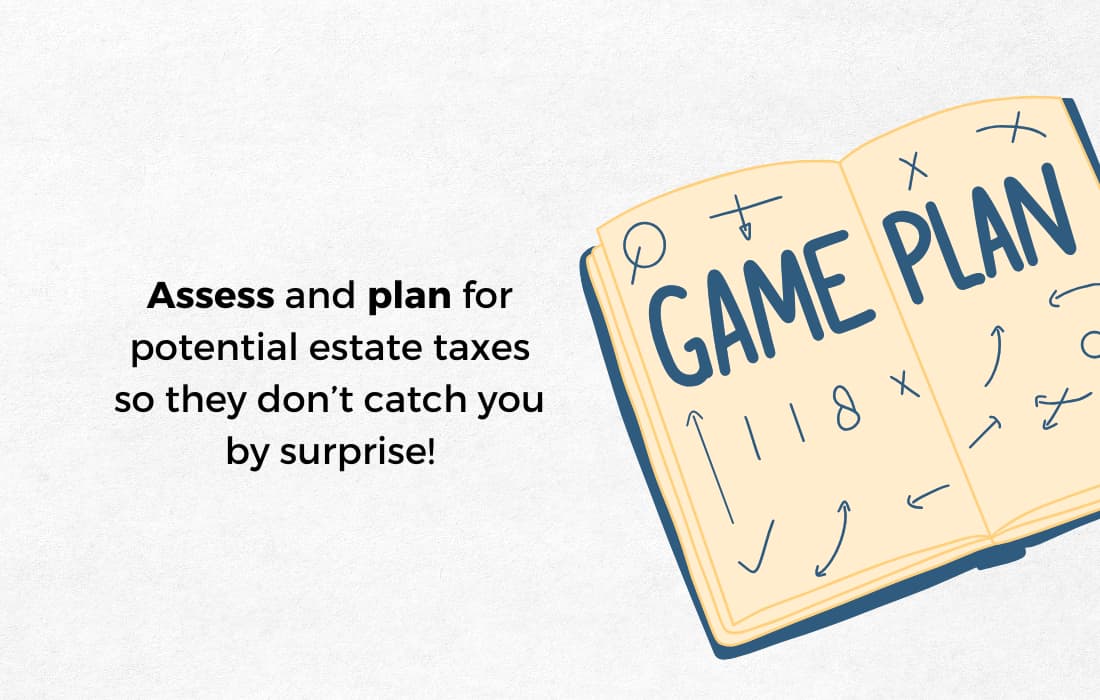
Estate Planning Documents
If you’re doing your estate planning, you may be starting to feel overwhelmed. And you might be wondering, “What other estate planning documents have I forgotten to consider?!”
Here’s a list of the main estate planning documents that Canadians should consider putting together:
- Bank and investment statements with account numbers and beneficiary designations
- List of all assets
- List of all liabilities
- Any corporation or partnership documentation
- Trust documents
- Insurance documents
- Will
- Power of Attorney document (POA)
- Health Care Directive or Living Will
- Birth certificate and death certificate, if relevant
- Marriage and or divorce certificates
- Funeral plans
- Final wishes
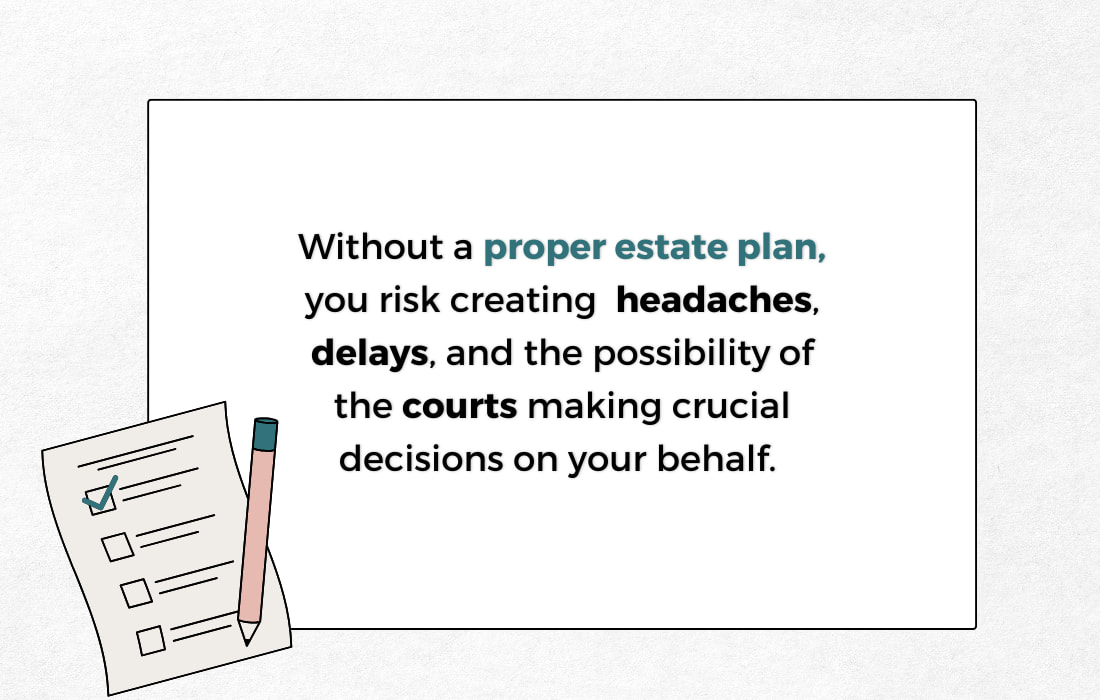
Estate Planning Q & A
Why is estate planning so important?
Without a proper estate plan, you and your loved ones risk dealing with headaches, delays, and the possibility of the courts making crucial decisions on your behalf.
Remember, accidents can happen, and by planning ahead, you can confidently ensure that your family is protected and your assets are distributed according to your wishes. Estate planning not only safeguards your legacy but also helps minimize taxes and complications, making it important even if you are young and don’t necessarily feel “wealthy.”
Which legal documents do I need to get started with my estate planning?
Essential documents include a will, power of attorney, healthcare directive, and a comprehensive list of all your assets.
These represent the foundational elements of an estate plan, and you may require additional documents to effectively safeguard your finances and healthcare decisions.
What are the steps in the estate planning process?
1. Outline Your Goals: Start by identifying your objectives, such as protecting your young family or minimizing tax liabilities.
2. Draft the Necessary Documents: Create legal documents to support your goals, including a will, power of attorney, healthcare directive, and trust documents.
3. Implement the Plan: Work with an estate planning attorney to finalize and sign your documentation.
4. Regularly Review Your Estate Plan: Periodically assess your estate plan to ensure its accuracy, considering changes in your life circumstances and evolving laws.
Does Canada have estate taxes?
Canada does not impose an estate tax like the United States.
However, death in Canada is still typically considered a significant taxable event due to the concept of “deemed disposition.” This rule states that when you pass away, you are deemed to have sold all of your assets at their fair market value, which often results in a capital gain, leading to tax liability.
This applies regardless of whether you actually sold the asset.
For example, if you purchased a stock for $100,000 and, at the time of your death, the fair market value is $200,000, you would incur a capital gain of $100,000. In this case, 50% of that capital gain would need to be reported as income on the deceased’s final tax return and can be taxed at their current marginal tax rate.
Many individuals do not adequately plan for the substantial tax liability that arises upon death in Canada, which can include taxes on corporate ownership and other investments. However, with proper estate planning, these taxes can be planned for, and strategies can be implemented to potentially minimize them.
Important Note: While there are exceptions to this rule, such as rollovers for spouses and qualified beneficiaries, these are limited and require careful planning.
Are estate taxes different in all the provinces?
First, there is technically no estate tax or inheritance tax in Canada.
However, the marginal tax rates vary by province, and the deemed disposition rule applies at the federal level.
While individuals do not pay estate tax, they may incur capital gains taxes on their assets upon death, which can differ based on the province of residence. (See the previous question for more details.)
Additionally, probate fees vary by province and can significantly impact the overall costs of administering an estate, so it’s essential to factor these fees into your estate planning. Understanding these differences can help ensure that your estate is managed efficiently and that your beneficiaries receive their intended inheritance.
How much are probate fees in Canada?
In Canada, there are no probate fees in Quebec, while every other province imposes probate fees based on the total value of the deceased person’s estate.
For instance, Ontario charges a probate fee of 1.5% of the estate’s value.
These fees can vary significantly from one province to another, often impacting how much your beneficiaries will receive after the estate is settled. It’s important to factor in these fees when planning your estate, as they can add up due to the size of the estate. For an accurate assessment, you can use a probate fee calculator, such as the one available at Legal Wills.
Is tax planning part of estate planning?
Yes, tax planning is an integral component of estate planning.
It can significantly reduce the taxes owed by your estate, ensuring that more wealth is passed on to your beneficiaries. In other words, effective tax planning helps safeguard your loved ones’ inheritance from being diminished by tax liabilities.
Do life insurance policies help with estate planning?
Yes, life insurance is often a crucial component of estate planning because it can help cover taxes, replace lost income, or leave a lasting legacy.
In Canada, the death benefit from a life insurance policy is generally tax-free and is generally paid out promptly as a lump sum. This ensures that your beneficiary receives the funds quickly, providing liquidity.
Here are a few ways in which life insurance can be beneficial for estate planning:
- Facilitating Business Succession: For families with a business, life insurance can smooth the succession plan and equalize the estate. This is especially helpful when some family members are actively involved in the business, and others are not. The insurance proceeds can provide financial flexibility without the need to sell a non-liquid asset or dissolve the business to ensure equitable treatment among family members.
- Supporting Young Families: If you are the primary breadwinner with debt and dependents, insurance can cover ongoing expenses and replace lost income, providing peace of mind for you and your loved ones.
- Covering Estate Tax Liabilities: Life insurance can assist in paying any significant tax bill incurred due to the deemed disposition rule in Canada. The deemed disposition rule means that many people’s final tax return will be substantial, and tax can eat into your loved one’s inheritance. If you want to give more to your family, you may wish to use insurance to cover taxes and fees upon death.
- Charitable Giving: Life insurance is one of the most cost-effective ways to make a charitable donation. By naming a charity as the beneficiary of the death benefit, you can leave a meaningful legacy without affecting your estate during your lifetime.
Does proper estate planning require a trust?
Not always.
Trusts are beneficial for controlling wealth distribution and reducing taxes, but not every estate needs one. The rules in Canada are comprehensive, and you will need proper advice. In the U.S., revocable living trusts are often used for probate planning.
Whether in Canada or the U.S., you need to speak to a lawyer if you are considering a trust.
What are common estate planning mistakes?
Common estate planning mistakes include having an outdated will, unclear beneficiary designations, and insufficient tax planning.
Failing to regularly update your will can lead to unintended consequences, such as outdated instructions that no longer reflect your wishes. Additionally, unclear designations can result in disputes among beneficiaries, potentially delaying the distribution of your assets.
A lack of tax planning can also leave your estate vulnerable to significant tax liabilities that could diminish the wealth passed on to your heirs. To avoid these pitfalls, it is crucial to seek professional advice and regularly review your estate plan, ensuring that it aligns with your current situation and goals.
Is estate planning only for the ultra-wealthy?
No, estate planning is not exclusively for the ultra-wealthy.
Everyone can benefit from having an estate plan, as it provides valuable protection for your assets and ensures that your wishes are honoured. While high-net-worth individuals may face more complex challenges that require expert assistance—such as the risk of incurring higher taxes without proper planning—estate planning is essential for individuals at all income levels.
Even if your estate is simpler, an effective estate plan is still designed to safeguard you and your loved ones, providing peace of mind for the future.
Is a DIY will a legal document?
Yes, a DIY will is a legal document; however, it often fails to adequately address complex needs or the intricate legal nuances involved in estate planning.
Many individuals overlook vital elements, leading to potential disputes or challenges after their passing. For this reason, having a professionally drafted will is generally a safer option, as it can provide clarity and ensure that your wishes are properly documented and enforceable.
How can I find a good estate planning lawyer in Canada?
To find a reputable estate planning lawyer in Canada, start by seeking referrals from trusted friends, family members, or financial advisors.
Verify their credentials and ensure they have a solid track record in estate planning, particularly with high-net-worth estates.
Additionally, if your situation involves cross-border issues, it is advisable to work with a lawyer who specializes in cross-border estate planning to navigate the complexities effectively.
Get the Free Guide and Audio Meditation for Manifesting Your Dreams
Pop your email address in the form below to get my easy checklist and guide to manifesting and the guided audio meditation to help you get started.
You’ll also get one or two emails per month with the latest blog posts about abundance, wealth-building, manifesting, and creating a fulfilling life.
Related Articles
💎 Why Estate Planning Isn’t Just for the Ultra-Wealthy
💎 Why to Use Trusts for Estate Planning
💎 When to Use a Trust for Estate Planning
About the Author

TIFFANY WOODFIELD is a financial coach, cross-border expert, and the co-founder of SWAN Wealth based out of Kelowna, BC. As a TEP and associate portfolio manager, Tiffany has extensive experience working with successful professionals who want to leave a legacy and enjoy an adventurous, work-optional lifestyle. Tiffany combines extensive knowledge from her background as a financial professional with coaching and her passion for personal development to help her clients create a unique path that allows them to live their fullest potential. Tiffany has been a regular contributor to Bloomberg TV and has been interviewed by national and international publications, including the Globe and Mail and Barron’s.